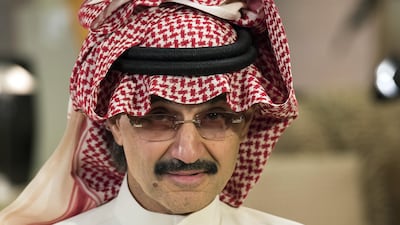Equities in Saudi Arabia could face a bumpier ride in the coming days and weeks amid uncertainty about the implications of the country’s anti-corruption drive, with the impact already being felt in the wider Arabian Gulf region, even as the shake-up promises to improve the kingdom’s economy in the longer-term.
The Saudi stock exchange (Tadawul) fell as much as 3 per cent on Tuesday afternoon, before recovering to close down 0.7 per cent, as investors concerned by the recent arrest of several prominent business leaders wondered if other figures are likely to be detained.
Every stock market in the Arabian Gulf ended the day lower, with Dubai and Kuwait both recording their steepest one-day declines of the year.
“Investors are very wary,” Meriem Kaddour, an analyst with Alphamena in Tunis said.
“The political context is dominating investors’ mood, so they’re neglecting company’s strong operating models and positive financial results, as they’re only seeing the politics.”
The uncertainty has pushed oil to $64 per barrel, a two-and- a-half-year high, and had a negative impact on the share price of Kingdom Holding, the investment vehicle of billionaire businessman Prince Alwaleed bin Talal, after reports of his detention emerged on Sunday.
____________
Read more:
Trump lends support to Saudi Arabia in arresting those 'milking the country'
New Saudi committee to investigate public corruption opens 'new era of transparency'
____________
The company’s shares sank 10 per cent on Tuesday to 8.10 Saudi riyals, its lowest close since late-2011, taking its losses for the week so far to 21 per cent.
“This is a natural concern for investors to reduce exposure…due to the fact that there is an allegation under process against the biggest shareholder of the company,” said Tariq Qaqish, managing director of asset management at Menacorp. “This is their right to be concerned, I think the Saudi government will play it right in terms of protecting minority interests.”
Shares in Al Tayyar Travel slumped 9.9 per cent yesterday, after it emerged that the company’s founder, Nasser bin Aqeel Al Tayyar was also among those detained.
The anti-corruption drive, launched by Crown Prince Mohammed bin Salman on Sunday, may prompt Saudi companies to delay investment decisions in the short-term, impacting economic growth.
“Other firms that haven’t been impacted so far will be waiting to see if they’ll be implicated in a future crackdown, leading them to hold back investment,” said Jason Tuvey, a Middle East economist with London-based Capital Economics.
“Foreign investors may also be deterred from making short-term investments, as much of the business that’s conducted is in partnership with such large firms.”
However Mr Tuvey noted that the anti-corruption drive, if followed through on, may benefit Saudi Arabia’s economy in the longer term, significantly improving the ease of doing business, particularly for SMEs.
Exotix Capital said yesterday in a research note that the arrest of senior business and political leaders may prove to be “a necessary condition for pushing the austerity and transformation agenda, the benefits of which very few investors are pricing in.
“Austerity and transformation require such a profound shift in Saudi economics that is it really so surprising that they are coincident with an equally profound, precursory shift in Saudi politics? Those investors prepared to take on board the long-term risks of Saudi may welcome the disruption of status quo politics.”
In the shorter term, Lebanon's economic prospects also face uncertainty, after Saudi Arabia accused the country's government of declaring war against it because of what it said was aggression by the Iranian-backed Lebanese Shiite group Hezbollah.
In an interview with Saudi's Al-Arabiya TV, the country's Gulf affairs minister Thamer al-Sabhan said the Lebanese government would "be dealt with as a government declaring war on Saudi Arabia" because of what he described as aggression by Hezbollah.
His remarks came following the resignation of Prime Minister Saad Hariri during a visit to Saudi Arabia on Saturday, blaming Iran for internal meddling and its proxy Hezbollah in his resignation speech.
Rating agency Moody’s warned the reopening of the country's political vacuum would damage the country’s credit rating.
“A drawn-out political stalemate less than a month after the government passed its first budget in 12 years would undermine recent institutional improvements and expose the banking system to a loss in confidence,” the agency said in an emailed note.
“Any loss of confidence in the banking system or in the stability of Lebanon’s institutions leading to a significant slowdown in private sector deposit inflows or outright outflows would be credit negative.”
The price of Lebanese 10 and 20 year bonds fell to fresh lows yesterday. Lebanese banks hold the bulk of the country's public debt which reached $77.3 billion in August, a debt to GDP ratio of 148 per cent, due to a sluggish economy and increased geopolitical tensions that have dented investor confidence.

